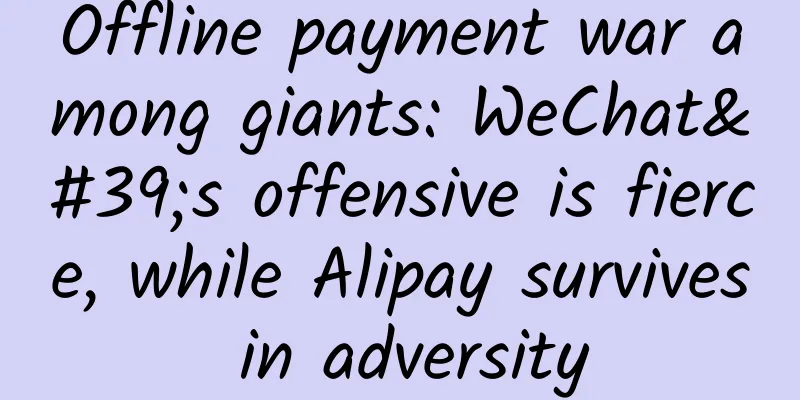Who is the eternal loser in the great merger and acquisition?

|
Could it be the boss? Behind every successful business merger and acquisition, there is a frustrated boss and a buried dream. In the Hollywood romantic movie "Meet Joe Black" (forgive me for not mentioning the cliché Chinese translation), the boss Anthony Hopkins was ready to sell his company, but after learning from the cute death god Brad Pitt that he was going to die soon, he immediately chose to say no to the deal. At the last moment of his life, the career he was unwilling to fight for all his life also disappeared. Merger is the only thing worse than acquisition. The Economist magazine once made a metaphor that "corporate mergers have a higher failure rate than Hollywood star marriages." There are already too many examples in traditional industries. The merger of AOL and Time Warner proves that no matter how well-matched a marriage is, there may be emotional discord; the joining of Daimler-Benz and Chrysler only illustrates how incompatible the German engineering culture is with Iacocca's blue-collar culture; perhaps only the marriage of InBev and Budweiser can be considered a success. When everyone gets drunk together, any unhappiness will disappear. The reason why mergers and acquisitions are so tragic is that the utopian dual leadership advocated by PR articles does not exist at all. Otherwise, Chao Gai would not have to fight with Wang Lun, and Liangshanpo would not have to rank its heroes. It is very rare to see a strange case like Yu Yongfu who turned into a professional manager after giving up UC and then managed AutoNavi for Alibaba. It is common sense that the boss of the weaker party will fade out sooner or later, but this loss is compensated: First, venture capital in the Internet era has made it possible to "spend other people's money to pursue your own dreams", which has made the emotional and opportunity costs of "selling art and then selling yourself" or banding together for warmth much smaller than those of the older generation; Secondly, the possible withdrawal of people like Wang Wei of Tudou, Lu Chuanwei of Kuaidi, and even Zhang Tao of Dianping, Yang Haoyong of Ganji, Gu Yongqiang of Youku, and Zhou Hang of Yidao in the near future is certainly a mental ordeal, but it will bring rich material rewards. The only thing lost is face. For this point, the public relations team who understands this will work at full capacity. If they have a calm mindset, these bosses who have retired can just rest in peace and enjoy the world without having to bear the terrible glory and responsibility. If they must do as Jobs did to Sculley, "Do you want to sell sugar water for the rest of your life, or do you want to change the world?" and have overflowing ambitions and nowhere to vent them, they can also start a new business, make a comeback, and become a serial entrepreneur. Three days after the merger of Youku and Tudou, Wang Wei announced his retirement. He took away Tudou's animation team and founded Light Chaser Animation to fulfill his dream of creating China's Pixar. Today, Gu Yongqiang is probably facing the same choice. In short, they may have lost the chance to become gods, but they are definitely not losers. Is it a competitor? Every merger and acquisition requires a suitable imaginary enemy to prove the wisdom of the decision. Didi and Kuaidi’s target is Uber, while Meituan and Dianping directly pick on BAT-level opponents, but mergers and acquisitions have never been the last straw that breaks the camel’s back for competitors. Taking group buying as an example, the big brother Meituan and the second-largest Dianping have jointly grabbed 81.4% of the market share, overwhelming Nuomi's 13.6%. This is nothing more than an attempt to verify the following formula: as the most mature local life service at present, group buying will carry the future of the O2O model. In the first half of this year, China's group buying transaction volume was 77.01 billion yuan, up 167.7% year-on-year, which seems to confirm this inference. However, this is false. Not to mention whether it is wise for the new company to risk its life to challenge Nuomi, one of the fulcrums of Baidu's 20 billion O2O strategy, just in terms of group buying itself, the industry pioneer Groupon and the second largest group buying website in the United States LivingSocial are both laying off employees. Groupon's stock price has almost been halved this year, with a cumulative decline of 56.54%. The company is desperately transforming to e-commerce. In today's marginalized group buying, talking about joining forces to suppress or even eliminate Nuomi is a very insignificant topic in any case. As for the food delivery market, although it is a rising star in the local O2O market, it is still in a money-burning era like the taxi competition. Dianping's past strategy was to invest in Ele.me to compete with Meituan Waimai. After the three companies became friends, even according to the most optimistic estimates, their market share would not exceed 30%. Instead, it gave birth to a labor-intensive enterprise with more than 30,000 employees, low gross profit margins, and a very miserable business format and model. It has basically lost the genes of an Internet company. Baidu Waimai, carrying Li Yanhong's strategic mission and its high-frequency scenarios are bundled with the ideals and future of Baidu Wallet, is much more determined than any opponent on the road of rapid expansion and bearing losses. How can Meituan + Ele.me + Dianping compete even if they want to? Are you an investor? The Sisyphus-like toil of investors is to constantly practice Zuckerberg's famous saying: The easiest mistake entrepreneurs make is to persist in vain and give up too early! A successful merger and acquisition will obviously help prevent such "stupidity". Homogeneous competition that enjoys burning money, no matter how awesome the companies involved are, may also drag down the best business model and drag investors into an abyss of no return while burning money to start a market. Sequoia Capital's Shen Nanpeng's track superiority theory aims to solve this problem. In 2006, Sequoia China gave Dianping.com $2 million. In 2010, while making additional investments, it also gave Meituan $10 million in the A round. The strategy of buying the entire track instead of betting on individual racers seems to encourage differentiated competition on the surface, but in fact it is a modern version of "two peaches kill three warriors", using money as bait to lure fierce fights, and then clean up the mess after the truth is revealed. However, before the situation develops into the out-of-control competition between Didi and Kuaidi, where they burn 30 million a day, this can also be said to be an emergency hedge. The so-called track theory is actually to accelerate elimination. Regardless of whether the merged Meituan and Dianping can support the future of O2O, the scale barrier established is at least an effective guarantee for IPO. As for whether the labor-intensive business model that has expanded is healthy, it is not within the scope of consideration. Goldman Sachs's motto "We are greedy, but we are greedy for the long term" is just talk. Quick in and out is the only way for Internet venture capital. The biggest difference between an investor and an entrepreneur is that there is no ideal or emotional element in his business strategy. He can make money from the success and failure of others, and that's enough. The merger of LeEco and Yidao is another case. Jia Yueting resolutely took over when Zhou Hang's ideals were about to burn out. He made a failed business at the right time. Yidao is sliding to the bottom of the Chinese private car market, with a market share of only 2.7% in Q2. While LeEco is glad to have picked up a vent at a bargain price, does it have the ability to make the latter a revival? LeEco is either too rich to show off, or it wants to find a mobile show on wheels for its endless new products! There is one point that many people overlook. LeTV and Yidao are actually two partners with highly compatible spirits. The fact that more than 30 vice presidents were set up at one time shows Jia Yueting's greed for product line expansion, while Zhou Hang's Yidao has countless stars and seas, as well as many gimmicks such as Haiyi Travel and Yiqi Automobile. This mutual discovery only proves the truth that birds of a feather flock together. There is no need to worry about Jia Yueting, because this incomprehensible strategy is part of LeTV's core competitiveness. Who is the loser? In the Internet startup circle, it is normal for bosses to give orders, executives to hang out on forums, and grassroots employees to stir up hatred. After Dianping invested $80 million in Ele.me in May 2014, the fight with Meituan expanded from group buying to food delivery. In June, August and September, they had many fights. In third- and fourth-tier cities where business expansion was most intense, such as Changzhou, Zhenjiang, and Xianning, the fight between the two sides escalated to the point where each side posted photos of their injuries. Dianping also sent a lawyer's letter to Meituan. However, it is precisely these small people who stick to the front line who are the hardest hit by mergers and acquisitions. Take group buying as an example. Half of Groupon's gross profit of 40% is eaten up by labor and marketing costs. This is the main reason why its stock price quickly shrank by three quarters after its listing in 2011. Meituan's sales in May this year were 380 million, but its gross profit was only 7%. Meituan must achieve a gross profit margin of more than 8% to enter the profit channel, which can only be achieved if it has monopoly privileges. Of course, it is the employees who pay the price. In terms of food delivery, Dianping, Ele.me, and Meituan's huge teams of more than 10,000 people will inevitably encounter the problem of rationalizing redundant services, which is bound to end in blood and tears. Options are another blow. When Dianping completed its Series D financing in 2012, there were rumors that its share capital expanded from 50 million to 800 million, a dilution of 16 times. In February 2014, Zhang Tao firmly stated at a press conference when Tencent acquired a 20% stake that "Dianping will develop independently and will definitely IPO independently", and even planned to return to the A-share market. Meituan has also always had the concept of job options, which makes the rule of exercising options after 4 years very uncertain. But now that the listed entity has been transferred to a new company under the VIE structure, although the management's control over the company has been strengthened, the exercise of employee options has added many complex constraints. The first painful shock of mergers and acquisitions is layoffs. The acquisition of Compaq Computer completed by Carly Fiorina, the most popular Republican female candidate in the United States today, when she was in charge of HP, caused 30,000 of the 148,100 employees to lose their jobs within three years. Dell and EMC will create a giant with 177,800 employees. The new company is burdened with 40 billion US dollars in debt, and the interest alone is 3.2 billion US dollars per year. Pessimistic EMC employees have even caused a panic drop in housing prices in Massachusetts. Therefore, the real resistance to mergers and acquisitions does not come from the bosses, investors or bankers who have reserved a way out through institutional design, but from the ordinary employees who had no prior warning. It is these people who struggled to save the company on the eve of the disillusionment of their dreams: When Tudou was seriously ill, the employees in the product department were still brainstorming desperately and even came up with the terrifying idea of a near-death experience; when Yang Yang, who loved carpooling, dejectedly admitted that "there is nothing to adjust and there is no point in holding on", the employees were still shouting that they would fight one more time before they died; the last day of the Koala bus on September 11, 2015 was portrayed with the pride of "the wind is whistling and the Yishui is cold, the warriors will never return once they leave", and also had a sense of déjà vu of "The Last Night of Madame Chin". Among those mergers and acquisitions that have made history, the most fatal thing is the handshake and reconciliation between old enemies. Not everyone can bear the reversal of yesterday's enemies becoming comrades in arms today. This is very similar to Lin Chong who rebelled against Liangshan and suddenly found that he had to serve as a minister with Gao Qiu after being recruited. For ordinary people like me, it is difficult to comment on the business operations at the company level. I just hope that the big guys can also understand the ups and downs of the little people in the sea of stars! |
<<: 20 new tricks Facebook is using to eat up the Internet: Do you want to learn from them?
>>: Hangzhou Internet Entrepreneurship Guide 3.0 2015
Recommend
Is it a "leader" or a "useless"? Bull remote timing remote control socket review
The cost of sockets in smart homes is the lowest,...
2016 Presidential Economic Report: Robotics is like the steam engine revolution
For the first time, robots were the subject of th...
Enjoy music anytime, anywhere with Dianmang 2 face personalized experience
With the acceleration of the pace of life and the...
I recommend a project that can earn 300,000 yuan a year. It only requires one person to work 5 hours a day!
Today I will share with you a money-making projec...
Take it and use it directly: 36 small and beautiful money-making projects that will make you earn 100,000 yuan a month
Take it and use it directly: 36 small and beautif...
10 product details analysis to show you how big manufacturers design!
Micro-design is an insight into the pain points i...
Dongfeng Peugeot 4008 also publicly reduced its configuration. Does the official still owe us a price cut?
Yesterday, 91che reported the news that Dongfeng ...
[Longtou Taishan] "Longtou Daily Limit Code Course and VIP Information" Market Sentiment Strategy PDF Article
【Longtou Taishan】"Longtou Daily Limit Code C...
The App Store in iOS 11 has changed a lot. What impact does it have on us?
After WWDC 17 ended, many people focused their at...
Can eating chili peppers speed up the recovery of oral ulcers? To prevent oral ulcers, you can start from 4 aspects
gossip Not long ago, I saw a comment under a shor...
The "smallest sun of the year" appeared in the sky today, at 15:11!
At 15:11 on the 4th, the Earth reaches its orbita...
This key indicator in the collider is actually related to the barn
What does "brightness" mean in particle...
Offline operation promotion: 28 ways to attract new customers!
Today I will introduce to you offline methods of ...
Douyu Product Operation Analysis Report
Although Douyu has always been in a leading posit...









